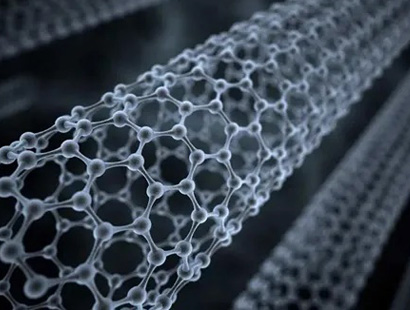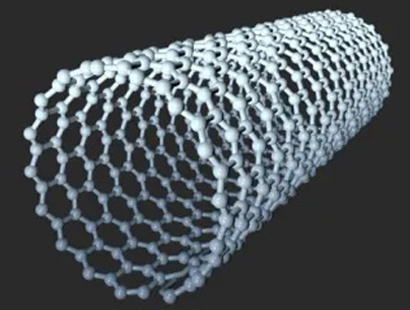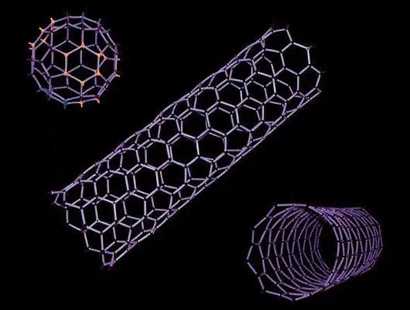-

Composite materials field
Due to their excellent electrical and mechanical properties, carbon nanotubes are considered an ideal additive phase for composite materials. Carbon nanotubes, as reinforcing and conductive phases, have great potential for application in the field of nanocomposites. Carbon nanotube polymer composite material is the first carbon nanotube composite material that has been industrially applied. Due to the addition of carbon nanotubes with excellent electrical conductivity, the insulating polymer has achieved excellent electrical conductivity. In the field of materials, carbon nanotubes can be used as material reinforcing agents. Adding carbon nanotubes to materials such as plastics and rubber can improve their strength, hardness, and wear resistance. In addition, carbon nanotubes can also be used as battery electrode materials due to their high specific surface area and high conductivity. -

In the field of new energy
Lithium ion batteries: Carbon nanotubes, due to their unique electrical properties, can be used for the positive and negative electrodes of lithium-ion batteries, providing more insertion sites and increasing the capacity for charging and discharging. Power lithium batteries: Carbon nanotubes can be used as conductive agents for power lithium batteries, and due to their leading domestic production capacity, they will be more widely used as conductive agents in lithium batteries. The global carbon nanotube conductive paste market will maintain a high-speed growth of over 20% in the next four years. Solar cells: The high conductivity and light absorption properties of carbon nanotubes can be used to manufacture solar cells. Hydrogen fuel cell: Carbon nanotubes can be used as catalyst carriers in hydrogen fuel cells to enhance catalyst activity and stability, thereby improving the efficiency and lifespan of the cell. Supercapacitors: Carbon nanotubes, due to their high specific surface area, can be used to manufacture supercapacitors, increasing their energy density and power density. Electrocatalyst: Carbon nanotubes can be used as electrocatalysts in reactions such as water splitting to produce hydrogen and carbon dioxide reduction to prepare organic compounds, improving reaction rate and efficiency. Solar photovoltaic materials: Carbon nanotubes can be used to manufacture solar photovoltaic materials and improve the photoelectric conversion efficiency of photovoltaic materials. -

Electronic field
Carbon nanotubes have a wide range of applications in the field of electronics. Due to their high conductivity and thermal conductivity, carbon nanotubes are widely used in electronic devices such as transistors. In addition, carbon nanotubes can also be used as phosphors for displays because they can emit light. Carbon nanotubes are also widely used as sensors in wearable electronic devices. -

Aerospace field
High temperature wear-resistant materials: Carbon nanotubes can be used to prepare high-temperature wear-resistant materials, such as aviation engine turbine blades. Carbon nanotubes have the characteristics of high strength, high stiffness, high thermal conductivity, and high chemical stability, making them ideal high-temperature wear-resistant materials. Air purifier: Carbon nanotubes can be used to manufacture efficient air purifiers. Due to its high specific surface area and chemical activity, carbon nanotubes can adsorb harmful gases and particles in the air. In addition, carbon nanotubes can also be used to manufacture efficient electromagnetic wave shielding materials, which is a very important application for the aerospace industry. Carbon nanotube sensor: Carbon nanotube sensors can be used to detect harmful gases and particulate matter in the air. Due to their electrical properties and chemical activity, carbon nanotubes can be used to detect various harmful gases and chemicals, including carbon dioxide, formaldehyde, benzene, ammonia, etc. Carbon nanotube sensors can also be used to detect physical quantities such as mechanical stress, temperature, and humidity. Spacecraft thermal control: Carbon nanotubes can be used to manufacture efficient thermal control materials. Due to its high thermal conductivity, carbon nanotubes can quickly transfer heat to the surface of spacecraft, thereby reducing heat accumulation and preventing spacecraft overheating. In addition, carbon nanotubes can also be used to manufacture efficient solar panels, improving the energy utilization efficiency of spacecraft.
 +8618653007758
+8618653007758
 English
English
 日本語
日本語
 한국어
한국어
 Россия
Россия
 Français
Français
 España
España
 عرب .
عرب .
 Português
Português
 Deutsch
Deutsch
 भारत
भारत
 Nederlands
Nederlands






